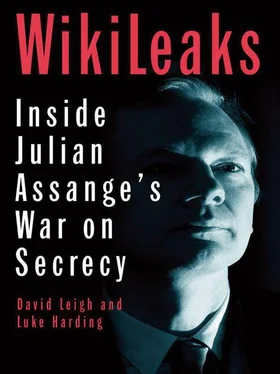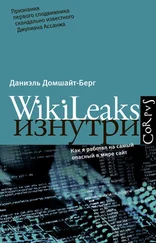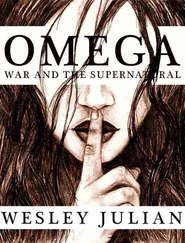Harding, Luke - WikiLeaks - Inside Julian Assange's War on Secrecy
Здесь есть возможность читать онлайн «Harding, Luke - WikiLeaks - Inside Julian Assange's War on Secrecy» весь текст электронной книги совершенно бесплатно (целиком полную версию без сокращений). В некоторых случаях можно слушать аудио, скачать через торрент в формате fb2 и присутствует краткое содержание. Жанр: Старинная литература, на английском языке. Описание произведения, (предисловие) а так же отзывы посетителей доступны на портале библиотеки ЛибКат.
- Название:WikiLeaks: Inside Julian Assange's War on Secrecy
- Автор:
- Жанр:
- Год:неизвестен
- ISBN:нет данных
- Рейтинг книги:3 / 5. Голосов: 1
-
Избранное:Добавить в избранное
- Отзывы:
-
Ваша оценка:
- 60
- 1
- 2
- 3
- 4
- 5
WikiLeaks: Inside Julian Assange's War on Secrecy: краткое содержание, описание и аннотация
Предлагаем к чтению аннотацию, описание, краткое содержание или предисловие (зависит от того, что написал сам автор книги «WikiLeaks: Inside Julian Assange's War on Secrecy»). Если вы не нашли необходимую информацию о книге — напишите в комментариях, мы постараемся отыскать её.
WikiLeaks: Inside Julian Assange's War on Secrecy — читать онлайн бесплатно полную книгу (весь текст) целиком
Ниже представлен текст книги, разбитый по страницам. Система сохранения места последней прочитанной страницы, позволяет с удобством читать онлайн бесплатно книгу «WikiLeaks: Inside Julian Assange's War on Secrecy», без необходимости каждый раз заново искать на чём Вы остановились. Поставьте закладку, и сможете в любой момент перейти на страницу, на которой закончили чтение.
Интервал:
Закладка:
Judges were as nonplussed as global corporations by this new publishing phenomenon. In one hearing in March 2009 the high court in London decided that no one was allowed to print documents revealing Barclays’ tax avoidance strategies – even though they were there for the whole world to read on the WikiLeaks website. The law looked a little silly.
But this new form of indestructible publishing brought sharp questions into focus. For every Trafigura there might be other cases where WikiLeaks could be used to smear or destroy someone. That made Assange a very powerful figure. The fact that there were grumbles among his colleagues about his autocratic and secretive style did not allay the fears about this new media baron. The questions kept coming: who was this shadowy figure “playing God”? How could he and his team be sure of a particular document’s authenticity? Who was determining the ethical framework that decided some information should be published, and some not? All this meant that Assange was in many respects – more, perhaps, than he welcomed – in a role not dissimilar to that of a conventional editor.
As this book describes, the spectacular bursting of WikiLeaks into the wider global public eye and imagination began with a meeting in June 2010 between the Guardian ’s Nick Davies and Assange. Davies had sought out Assange after reading the early accounts that were filtering out about the leak of a massive trove of military and diplomatic documents. He wanted to convince Assange that this story would have more impact and meaning if he was willing to ally with one or two newspapers – however traditional and cowardly or compromised we might be in the eyes of some hackers. An agreement was struck.
And so a unique collaboration was born between (initially) three newspapers, the mysterious Australian nomad – and whatever his elusive organisation, WikiLeaks, actually was. That much never became very clear. Assange was, at the best of times, difficult to contact, switching mobile phones, email addresses and encrypted chat rooms as often as he changed his location. Occasionally he would appear with another colleague – it could be a journalist, a hacker, a lawyer or an unspecified helper – but, just as often, he travelled solo. It was never entirely clear which time zone he was on. The difference between day and night, an important consideration in most lives, seemed of little interest to him.
What now began was a rather traditional journalistic operation, albeit using skills of data analysis and visualisation which were unknown in newsrooms until fairly recently. David Leigh, the Guardian ’s investigations editor, spent the summer voraciously reading his way into the material. The Guardian ’s deputy editor in charge of news, Ian Katz, now started marshalling wider forces. Ad hoc teams were put together in assorted corners of the Guardian ’s offices in King’s Cross, London, to make sense of the vast store of information. Similar teams were assembled in New York and Hamburg – and, later, in Madrid and Paris.
The first thing to do was build a search engine that could make sense of the data, the next to bring in foreign correspondents and foreign affairs analysts with detailed knowledge of the Afghan and Iraq conflict. The final piece of the journalistic heavy lifting was to introduce a redaction process so that nothing we published could imperil any vulnerable sources or compromise active special operations. All this took a great deal of time, effort, resource and stamina. Making sense of the files was not immediately easy. There are very few, if any, parallels in the annals of journalism where any news organisation has had to deal with such a vast database – we estimate it to have been roughly 300 million words (the Pentagon papers, published by the New York Times in 1971, by comparison, stretched to two and a half million words). Once redacted, the documents were shared among the (eventually) five newspapers and sent to WikiLeaks, who adopted all our redactions.
The extent of the redaction process and the relatively limited extent of publication of actual cables were apparently overlooked by many commentators – including leading American journalists – who spoke disparagingly of a willy-nilly “mass dump” of cables and the consequent danger to life. But, to date, there has been no “mass dump”. Barely two thousand of the 250,000 diplomatic cables have been published and, six months after the first publication of the war logs, no one has been able to demonstrate any damage to life or limb.
It is impossible to write this story without telling the story of Julian Assange himself, though clearly the overall question of WikiLeaks and the philosophy it represents is of longer-lasting significance. More than one writer has compared him to John Wilkes, the rakish 18th-century MP and editor who risked his life and liberty in assorted battles over free speech. Others have compared him to Daniel Ellsberg, the source of the Pentagon Papers leak, described by the New York Times ’s former executive editor Max Frankel as “a man of incisive, devious intellect and volatile temperament”.
The media and public were torn between those who saw Assange as a new kind of cyber-messiah and those who regarded him as a James Bond villain. Each extremity projected on to him superhuman powers of good or evil. The script became even more confused in December when, as part of his bail conditions, Assange had to live at Ellingham Hall, a Georgian manor house set in hundreds of acres of Suffolk countryside. It was as if a Stieg Larsson script had been passed to the writer of Downton Abbey , Julian Fellowes.
Few people seem to find Assange an easy man with whom to collaborate. Slate’s media columnist, Jack Shafer, captured his character well in this pen portrait:
“Assange bedevils the journalists who work with him because he refuses to conform to any of the roles they expect him to play. He acts like a leaking source when it suits him. He masquerades as publisher or newspaper syndicate when that’s advantageous. Like a PR agent, he manipulates news organisations to maximise publicity for his ‘clients’, or, when moved to, he threatens to throw info-bombs like an agent provocateur. He’s a wily shape-shifter who won’t sit still, an unpredictable negotiator who is forever changing the terms of the deal.”
We certainly had our moments of difficulty and tension during the course of our joint enterprise. They were caused as much by the difficulty of regular, open communication as by Assange’s status as a sometimes confusing mix of source, intermediary and publisher. Encrypted instant messaging is no substitute for talking. And, while Assange was certainly our main source for the documents, he was in no sense a conventional source – he was not the original source and certainly not a confidential one. Latterly, he was not even the only source. He was, if anything, a new breed of publisher-intermediary – a sometimes uncomfortable role in which he sought to have a degree of control over the source’s material (and even a form of “ownership”, complete with legal threats to sue for loss of income). When, to Assange’s fury, WikiLeaks itself sprang a leak, the irony of the situation was almost comic. The ethical issues involved in this new status of editor/source became more complicated still when it was suggested to us that we owed some form of protection to Assange – as a “source” – by not inquiring too deeply into the sex charges levelled against him in Sweden. That did not seem a compelling argument to us, though there were those – it is not too strong to call them “disciples” – who were not willing to imagine any narrative beyond that of the smear.
These wrinkles were mainly overcome – sometimes eased by a glass of wine or by matching Assange’s extraordinary appetite for exhaustive and intellectually exacting conversations. As Sarah Ellison’s Vanity Fair piece on the subject concluded: “Whatever the differences, the results have been extraordinary. Given the range, depth, and accuracy of the leaks, the collaboration has produced by any standard one of the greatest journalistic scoops of the last 30 years.”
Читать дальшеИнтервал:
Закладка:
Похожие книги на «WikiLeaks: Inside Julian Assange's War on Secrecy»
Представляем Вашему вниманию похожие книги на «WikiLeaks: Inside Julian Assange's War on Secrecy» списком для выбора. Мы отобрали схожую по названию и смыслу литературу в надежде предоставить читателям больше вариантов отыскать новые, интересные, ещё непрочитанные произведения.
Обсуждение, отзывы о книге «WikiLeaks: Inside Julian Assange's War on Secrecy» и просто собственные мнения читателей. Оставьте ваши комментарии, напишите, что Вы думаете о произведении, его смысле или главных героях. Укажите что конкретно понравилось, а что нет, и почему Вы так считаете.












